 Petzlover
Petzlover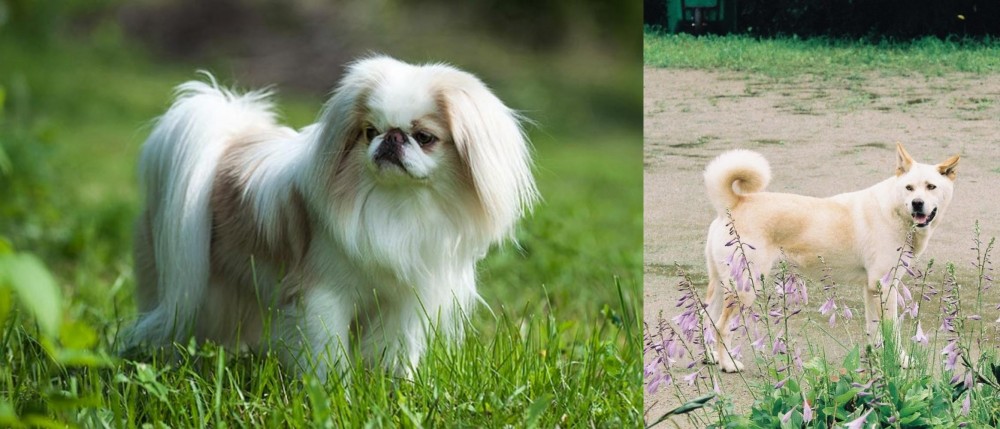 Japanese Chin is originated from Japan but Pungsan Dog is originated from North Korea. Japanese Chin may grow 33 cm / 12 inches shorter than Pungsan Dog. Japanese Chin may weigh 18 kg / 39 pounds lesser than Pungsan Dog. Both Japanese Chin and Pungsan Dog has almost same life span. Both Japanese Chin and Pungsan Dog has almost same litter size. Both Japanese Chin and Pungsan Dog requires Moderate Maintenance.
Japanese Chin is originated from Japan but Pungsan Dog is originated from North Korea. Japanese Chin may grow 33 cm / 12 inches shorter than Pungsan Dog. Japanese Chin may weigh 18 kg / 39 pounds lesser than Pungsan Dog. Both Japanese Chin and Pungsan Dog has almost same life span. Both Japanese Chin and Pungsan Dog has almost same litter size. Both Japanese Chin and Pungsan Dog requires Moderate Maintenance.
 The Japanese Chin, also known as the Japanese Spaniel, has always been known for thousands of years as a dog with strong companion characteristics.
The Japanese Chin, also known as the Japanese Spaniel, has always been known for thousands of years as a dog with strong companion characteristics.
Hailing from Asia, he is also known as the Japanese Spaniel. In Japan, the Chin dogs are royalty and lapdogs, and while the exact origin of the Japanese Chin isn't quite clear, it is an ancient toy breed.
The first Japanese Chin was brought to America in 1882. The toy breed was recognized by the American Kennel Club in 1888, as a Japanese Spaniel. The AKC changed the breed name to the Japanese Chin in 1977.
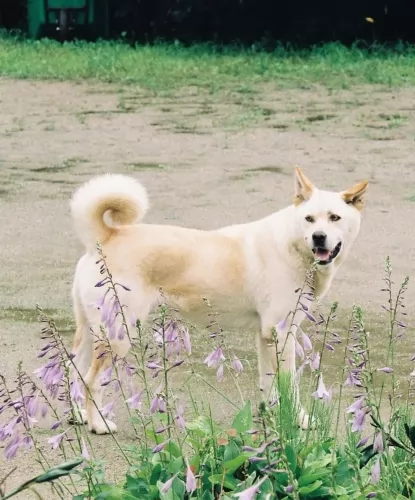 It is a hunting dog and considered to be a National Treasure of Korea. It was during the Japanese occupation of Korea that the dog’s thick coat was sought after for use in fur coats for the Japanese military.
It is a hunting dog and considered to be a National Treasure of Korea. It was during the Japanese occupation of Korea that the dog’s thick coat was sought after for use in fur coats for the Japanese military.
The population numbers plummeted dramatically, with the Korean War reducing the numbers even further. The North Korean government assisted with re-establishing them.
Today, the Pungsan isn’t recognized by the Federation Cynological International (FCI) and also remains unrecognized by any major kennel clubs.
 As a small sized dog, the oriental looking Japanese Chin stands at about 20 to 27cm in height and weighs roughly 2 to 6kg. He has a large round head with big brown eyes and a short muzzle. The ears are long and feathery and the tail is long and held up over the back.
As a small sized dog, the oriental looking Japanese Chin stands at about 20 to 27cm in height and weighs roughly 2 to 6kg. He has a large round head with big brown eyes and a short muzzle. The ears are long and feathery and the tail is long and held up over the back.
The long silky single coat is either white and red or white and black or it can be tri-colored too – white, black and reddish-tan.
The Japanese Chin is a small, evenly tempered dog and the toy-size dog, according to people who have owned him as a pet, say he has some cat-like features – the ability to leap and the ability to wash himself similar to what a cat does.
He is also a typical lap dog liking nothing more than to lie in your lap and be petted. He just loves being with his human family and his smallness allows him to fit well into city- or country life.
He is an intelligent dog. He is small but strong-willed and that is why both you and him will benefit from having him trained and socialized as he becomes more amicable and obedient.
Social, jaunty and content, he is everyone’s friend and will be a suitable playmate for children, being loving and devoted to his entire family. They make great therapy dogs as he has the knack of being sensitive to the feelings of people and adjusts his mannerisms to suit the people he is with.
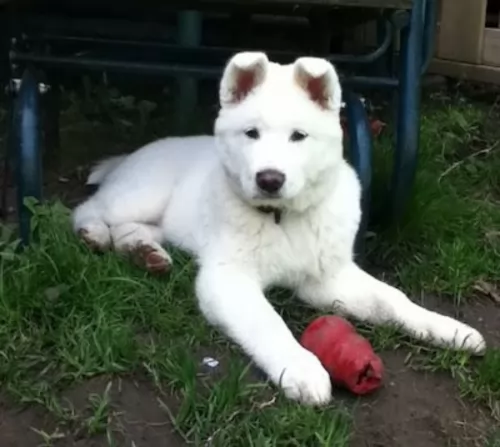 The Pungsan dog is a large dog – a kind of spitz-type dog which stands between 55 and 60cm in height and weighs between 18-24 kg.
The Pungsan dog is a large dog – a kind of spitz-type dog which stands between 55 and 60cm in height and weighs between 18-24 kg.
The dog has a thick whitish coat that even allows them to sleep in the snow. They have a muscular build with a deep chest. The legs are straight and strong, with the typical Spitz-type triangular head with the almond-shaped eyes and erect ears. The tail is high-set, curling over the back. After mating, within 60 – 70 days they can produce 2 to 4 puppies.
It it thought that the Pungsan’s intelligence is due to wolf DNA but there is a question mark over this. They are intelligent dogs though.
These dogs are always loyal and protective of their owners, forming strong bonds with them. They are strong-willed and independent and will require training and socialization if you want them to be obedient, well mannered dogs.
They’re intelligent so won’t have problems learning. When properly trained and socialized, they can be good playmates for children. He is also able to get along well with other animals in the house.
They’re aloof with strangers and have strong territorial instincts, but this just goes towards making them excellent watchdogs.
 The Japanese Chin is just longing to be your special friend. When you treat him with the love and care he deserves, you'll discover that he is a sweet, gentle companion who will be loyal and loving to his human family.
The Japanese Chin is just longing to be your special friend. When you treat him with the love and care he deserves, you'll discover that he is a sweet, gentle companion who will be loyal and loving to his human family.
He is a quiet pet and intelligent enough to be trained and socialized so that he is obedient and ready to please. Although he doesn't bark much, he makes quite a few other noises such as wheezing, snorting and snorting. He makes up for it by being entertaining and loving towards you so that you life is brighter just by having him in it.
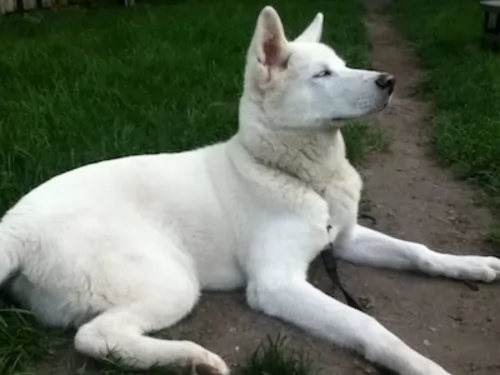 The Pungsan is a wonderful dog if you’re looking for an affectionate, loyal pet.
The Pungsan is a wonderful dog if you’re looking for an affectionate, loyal pet.
These dogs thrive on having an owner that is energetic and a strong leader. It likes to become involved in all the activities the family is involved in, loving to join them on hikes and camping trips. Its a dog that is also protective and territorial and makes a good watchdog too.
With proper training and socialization he gets on well with children and other pets in the home, making him a welcome canine family member for any busy household.
 There are a few health issues with your Japanese Chin that are worth knowing about such as hypoglycemia, cataracts and heart murmurs. Allergies and dental issues also need to be checked.
There are a few health issues with your Japanese Chin that are worth knowing about such as hypoglycemia, cataracts and heart murmurs. Allergies and dental issues also need to be checked.
Dog breeds with the flattened face always battle with dental-, eye and breathing problems. With good care however, your Japanese Chin can reach anything from 10 – 12 years of age.
Murmurs come about because of a disturbance in the blood flow and which can produce an audible noise. If your dog's murmur is associated with structural heart disease, your dog may display signs of congestive heart failure and he'll be weak for instance and be coughing.
When your dog gets to the vet, the course of treatment will be determined on the type of heart murmur. Luckily puppies with low grade murmurs often grow out of it but if you have an adult dog, routine diagnostic imaging may be recommended by your vet.
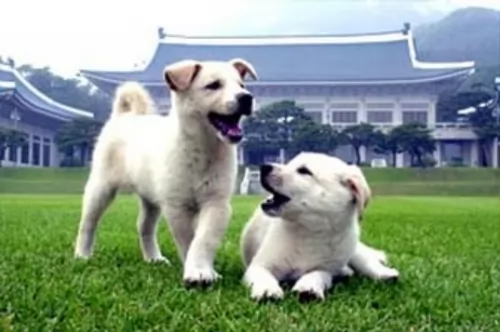 The Pungsan is a healthy breed prone to very few health issues, yet there will always be those common health issues that plague dogs like these. One of these is hip dysplasia, while others are obesity, bloat and cancer.
The Pungsan is a healthy breed prone to very few health issues, yet there will always be those common health issues that plague dogs like these. One of these is hip dysplasia, while others are obesity, bloat and cancer.
It can be very sad when your vet tells you that your dog has hip dysplasia. Fortunately with modern veterinary medicine, a dog can be kept happy with this ailment.
The hip joint doesn’t develop properly and painful wear and tear with arthritis makes it very difficult for the dog to be mobile. It’s a genetic condition but diet and environmental factors play a huge part too. Get your pet to the vet to ensure he is pain free.
Seizures in a dog can be caused usually because of trauma, tumor or infection. Seizures can start from as young as 6 months of age.Some seizures can last for a long time and are considered an emergency, requiring immediate veterinary help.Your veterinarian will want a complete history and perform a neurological exam.
 The Japanese Chin has a single coat, and a brush once or twice a week will keep the coat silky and untangled.
The Japanese Chin has a single coat, and a brush once or twice a week will keep the coat silky and untangled.
Check his ears for dirt and wax and try to wipe inside the ears, being very, very careful not to go deep into the ear to avoid damage.
Clip his nails and brush his teeth as small dogs are more prone to dental disease. Periodontal disease is preventable with dental cleaning. Dental disease starts when plaque sticks to the surface of the teeth. It hardens, spreads under the gum line and cause tissue damage. It also damages the immune system.
The Japanese Chin is an energetic dog and loves a game and a walk. It isn't the kind of dog that you will take on your hikes or swimming as it tends to huff and puff after a while from too much exercise, and more specifically in hot weather.
Dog experts say that a grain-free food is best for this kind of dog. Kibble which comes with lean protein and with plenty of vitamins and minerals such as taurine and carnitine is recommended. They are good for the joints, coat, heart and eyes. Japanese Chins can be prone to heart- and eye problems and kibble rich in omega 3 fatty acids will be good for the Chin for many excellent reasons.
If you're in any way uncertain about what to feed your Japanese Chin, speak to your vet as the type of food you feed your pet will determine how healthy he will be. Always ensure he has access to fresh, cool water.
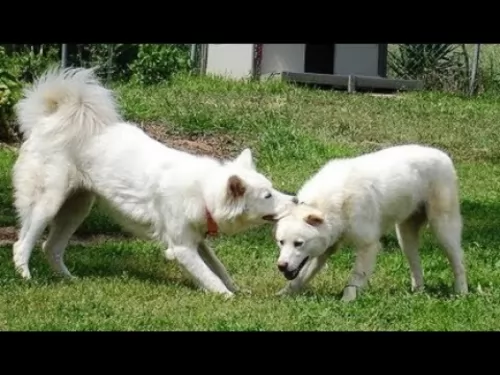 With his dense coat, this dog will require a brush twice a week to keep the fur free from matting and from loose hair. He is after all a fairly heavy shedder and will require this regular brushing to remove the dead hair and maintain the luster and sheen of the coat.
With his dense coat, this dog will require a brush twice a week to keep the fur free from matting and from loose hair. He is after all a fairly heavy shedder and will require this regular brushing to remove the dead hair and maintain the luster and sheen of the coat.
This is a strong, athletic dog and he is mentally sharp as well. He will require vigorous physical- and mental activity each day. He isn’t the kind of dog to lie around for long periods of time as this leads to frustration and destructive behavior and then the owner should be blamed.
Take him on walks or long hikes – he’ll love that – and play ball- and rope games with him. He will be quite game for swimming as well.
Your Pungsan dog can get to 14 years of age with good food. While you do get some excellent commercially manufactured dog foods, you want to be sure your pet gets some nutritious home-made food too.
Make sure that the kibble is the high quality ones with lots of vitamins and minerals. Add in some home-made food twice a week. Boiled chicken, brown rice or pasta and spinach, sweet potatoes and carrots are a healthy choice for your pet. Your dog will do well on plain, simple, nutritious, tasty food like this. Chop this food up and add it into the dry kibble a couple of times a week.
Some raw meat added in from time to time will help his skin and coat remain healthy. Never leave him without a constant source of fresh, cool water.